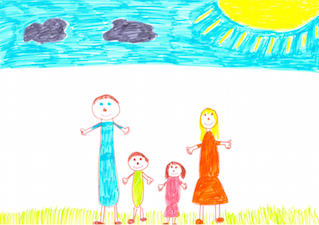
Divorce and separation can be a very tough and emotional time, especially where there are children involved.
Julie Brown, Solicitor Child Law specialist at Punch Robson Solicitors, has over thirteen years’ experience working in Family Law. She has worked closely with Court Welfare Officers, Social Workers and Child Psychologists in divorce and separation cases involving children. Below, she offers five tips for making a divorce/ separation as pain free as possible for children: –
- Try to hide any anger or bad feeling that you may have towards your ex-partner from your children.
You are bound to feel upset, hurt and often angry with an ex-partner. It can be tempting to release your emotions by speaking ill of them to your children or in their presence. You may even do so unintentionally. Try to keep any comments out of earshot of your children. Although you may not realise at the time, it is known to have an impact upon their emotional wellbeing.
- Avoid using the children as a ‘weapon’ against your ex-partner.
Due to the emotional nature of a breakup, people often want to cause upset to their ex-partner. Often people unwittingly use their children to cause this hurt. For example, they stop/limit their ex-partner’s contact with the children because they know it will have an impact. It is easy to act out of character under such emotional stress and it is a natural reaction to want to hurt those who have hurt us. However, try to be aware that using the children as a weapon will ultimately hurt the children themselves.
- Try to reach an agreement between you about the arrangements for the child/children.
As hard as it may be to discuss matters following a separation, it is much better for the children if you can. Either try to agree the arrangements between yourselves, or with the help of a mediator. Try to decide together where the children shall live and how much time they will spend with each of you. Children can pick up on any conflict and it is much better to agree matters between yourselves if possible. The alternative is allowing a Judge at Court, who is a complete stranger to your family, to decide the arrangements for you. Reaching an agreement that suits you both, but importantly has the child/children’s best interests in mind will make things easier. It will also avoid or keep any legal costs to a minimum. Children benefit from routine, but it is also good if you can have flexibility and ongoing communication with one another.
- Listen to your child, but keep in mind that children often tell one parent what they think they will want to hear.
It is important to listen to children, and take into account their wishes and feelings (depending upon their age). It is important however, to keep in mind that children will often tell a parent what they think that parent wants to hear. This could be along the lines of telling one parent that they did not enjoy spending time with the other, when this is not actually a true reflection of their feelings. Children can often feel torn when parents separate so take a cautious approach to what they say.
- Finally, make sure that your children know that despite the changes in your own relationship, you both still love them just as much.
A separation is tough for children, but they are resilient. Make sure that they know that they are in no way responsible and that you both still love them just as much and that this will not change.


